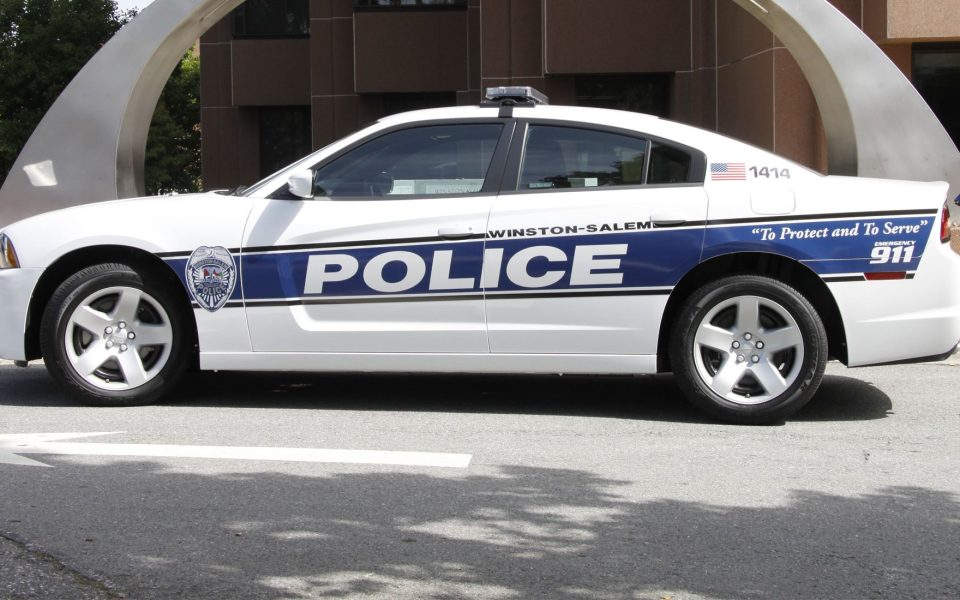In the year since George Floyd was murdered by former officer Derek Chauvin, police have fatally shot a reported 1,068 civilians across the United States, according to data by Mapping Police Violence. So far in 2021, police have killed 482 people, including 12 in North Carolina and one in the Triad. Police-reform activists continue to focus on bringing those numbers down.
The city of Winston-Salem is currently considering a co-response model similar to Greensboro’s, which was implemented last year. This would involve a police officer and a mental-health professional responding together to calls that have a mental-health component rather than an officer responding alone.
During a May public safety meeting, the city presented an overview of 911 call data, which is being used to determine whether an alternate response model would work for their police department. They hired RTI, a nonprofit research institute, to collect the data.
There were 578,338 calls involved in the analysis, which included calls from September 2017 through August 2020. Of those calls, 9,455 were officially classified as pertaining to mental health, which amounts to just under 2 percent.
“The overall project analysis helps identify the police services requested by residents,” said Meridith J. Martin, strategic initiatives administrator for the city. “The research helps determine the available systems that exist that could aid in providing a higher level of service.”
Martin said that the city will offer more information at the public safety meeting this August.
The problem, activists say, is that those calls would still have police officers involved.
For the past several months, leaders with Triad Abolition Project and Hate Out of Winston-Salem have been calling for an alternative to police when dealing with mental-health calls.
“We don’t need police every time there’s a call,” said Selene Johnson, a volunteer with Hate Out, an organization currently demanding police accountability in Forsyth County.
Johnson, who works with people every day who are dealing with mental-health crises, says that more often than not, police will escalate the situation. A 2020 investigation by TCB found that in the many instances in which people were killed by law enforcement officers in the Triad during the last decade, people suffering mental health crises made up a large portion of the deaths.
As part of the researching process, RTI conducted focus groups with the Winston-Salem Police Department patrol officers and first-line supervisors, according to Martin.
A presentation of the 911 call data during the May public safety meeting outlined that Winston-Salem police officers receive a variety of calls for service that they feel ill-equipped to handle. Officers also noted that they support a co-response model which could include mental health clinicians, emergency services or CIT officers.
Still, even with the call data, Johnson says she feels as though the percentage of calls that are flagged as mental-health related are low.
“We’re questioning how we can make models for our city when the data is inaccurate,” Johnson said.
In an August 2020 article by Vox, researchers stated that 911 call dispatchers often paint calls as being more serious to police if the callers are ambiguous about the circumstances. Because of this, article noted that “between 20 and 40 percent of all crime calls that 911 call takers enter are downgraded by officers once at the scene.”
Given the subjective nature of 911 calls and the way they are categorized, Miranda Jones, director of Hate Out, said they are advocating for more oversight, accountability and transparency. She says that while she believes the city has the people’s best interests at heart, she wonders how exactly they will determine what constitutes a mental health crisis without prior training.
“We’ve already been told [off the record] by one politician that they’re not going to defund the police,” said Jones. “So as activists, I’d be skeptical of any data that does not include the people.”
In this case, the only people viewing the data before its release were members of the Winston-Salem Police Department.
“We value and respect data, but we also recognize that it can be a tool of the have versus the have-nots if the intentions are not to give the people what they need,” said Jones.
Jones and the rest of Hate Out began demanding alternative models of policing that center around mental-health last year, after George Floyd was murdered in Minneapolis. They based their demands on the CAHOOTS model in Eugene, Ore., which involves sending mental-health professionals and medics to 911 calls rather than police officers.
CAHOOTS began in 1989 and responds to nearly 20 percent of all emergency calls in Eugene and neighboring Springfield according to Mental Health Portland. It developed as a result of discussions with Eugene’s government, the police and fire departments and other services. Because the program budget is about $2.1 million per year, the CAHOOTS team has saved Eugene an estimated $8.5 million every year.
The CAHOOTS model classifies several issues as mental-health related, including conflict resolution, welfare, substance abuse and suicidal ideation. Various cities across the country have now considering adopting a similar program.
This past April, Jones and others circulated a letter among mental-health professionals around the state asking them to testify whether they believe an alternative response would decrease the amount of police violence in the city.
“When the conversation moves beyond data collection with transparency with Black mental-health clinicians at the table, to being a part of the city and county’s budget, to implementation by nonprofits and agencies with measurable outcomes over time, then Hate Out will say that’s progress,” she said.
Hate Out sent the letter to the Winston-Salem city council and Mayor Allen Joines on May 6 with signatures from 107 mental-health professionals across the state.
“The clinicians could be a voice for the voiceless,” said Jones. “These clinicians are constituents. That’s why it was important to bring them in.”
Sabrina Basquez, a clinical social worker and therapist in Greensboro who signed the letter, called the letter a response to Black Lives Matter, which in her opinion is overdue.
“The fact is that when police officers who are not trained to help individuals with mental illness, they often use violence,” she said. “Mental-health people learn how to respond in non-violent ways. They’re trained and compassionate and kind. It’s a different perspective from police officers, who are quite frankly often on power trips.”
For folks with mental-health conditions like psychosis, paranoid delusions or autism, Basquez said what might look like a threat to a police officer is probably fear.
“They might not be resisting arrest,” said Basquez. “They might be turtling because they’re overwhelmed … Obviously the way we’re doing it isn’t working,” said Basquez.
Join the First Amendment Society, a membership that goes directly to funding TCB‘s newsroom.
We believe that reporting can save the world.
The TCB First Amendment Society recognizes the vital role of a free, unfettered press with a bundling of local experiences designed to build community, and unique engagements with our newsroom that will help you understand, and shape, local journalism’s critical role in uplifting the people in our cities.
All revenue goes directly into the newsroom as reporters’ salaries and freelance commissions.





Leave a Reply